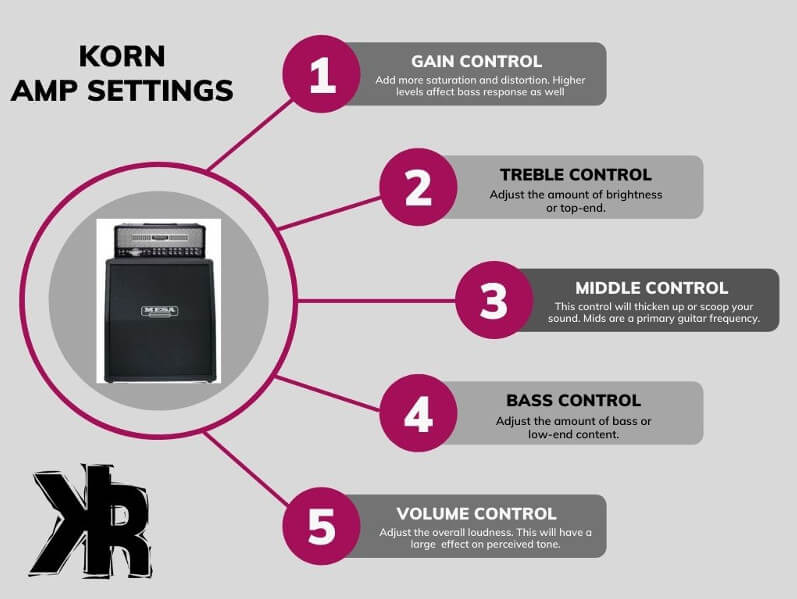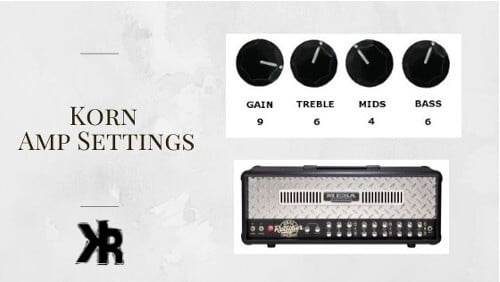Table of Contents
Korn came onto the music scene in the 1990s. The new, iconic nu-metal sound they introduced would change the direction of metal.
The ultra-low-end tone was further emphasized by using dropped tunings. Plus, the high-gain amplifier settings create a specific sound. This would help define an entire genre and a new sound.
In this Killer Rig guide, we’ll take a look at the best Korn amp settings and gear for getting that signature sound.
What is The Korn Sound?
Korn’s sound is characterized by heavy, down-tuned guitars with a lot of low-end. Brian Welch and James Shaffer use guitars that are played in drop tunings.
This is done to create even more low-end. They also use high-gain amplifier settings to get a distorted, crunchy tone.
Some Quick amp settings to sound like Korn are:
- Gain: 8
- Treble: 6
- Middle: 4
- Bass: 6
- Presence: 5
- Resonance: 5
The use of 7-string guitars creates a wider range of notes that the band can use for their sound.
Korn’s sound is also characterized by its use of “djent” techniques. This involves playing power chords with a palm-muted staccato picking technique. This creates a percussive, “chugging” sound that is the signature of the band.
Korn’s use of these techniques has heavily influenced the sound of modern metal.
What Gear Do You Need for a Korn Sound?
To get a Korn sound, you’ll need a few things:
- A 7-string guitar in a low tuning. Korn often uses dropped tunings like drop B or drop A.
- A high-gain amplifier like a Mesa Boogie Dual Rectifier or Revv Generator Mk3. This will help you get the distorted, crunchy sound that is the signature of Korn.
- Effect pedals like a delay, chorus, and even a gate. But these are optional and will only add to the tone.
- A good set of strings that can handle the low tunings. We recommend Ernie Ball Power Slinky 7-string sets.
With these things, you’ll be well on your way to getting that signature Korn sound.
Korn Amp Settings
Now let’s take a look at how the specific amplifier settings work. We will explore how they affect your tone so that you can dial in your favorite sounds.

Gain Control
The gain knob on your amplifier will have a big influence on your final tone. For a Korn sound, you’ll want to crank the gain up to get a distorted, saturated tone.
Yet, be careful not to go too high with the gain, or else you’ll start to lose clarity in your tone. If the gain is too high, your tone will start to become muddy and undefined.
The sweet spot for gain will be different for every amplifier. You’ll have to experiment to find the perfect level of gain for your amp.
Equalization Controls
The EQ controls on your amplifier will also have a big impact on your overall tone. For a Korn sound, you’ll want to emphasize the low end. But without compromising the other frequencies.
- The treble knob will need to be set to provide top-end clarity without becoming too harsh. You may need to adjust this control a few times while getting your low-end set right.
- The middle control will add thickness and body to your sound. This is best set at halfway when starting. Once you have your bass set right, add thickness with your mids control.
- Low-end is the focus of this tone, but not overbearing. If you add too much, it will simply get muddy and lose clarity. Once you have your gain set the way you like, add just enough bass to get the thump without the mud.
It will take some time to get the right settings with your gear. But it is best to start with all controls halfway when starting. If you have a presence or resonance control on your amplifier, adjust these last to add some air to your sound.
The presence control will add highs and help your guitar cut through the mix. The resonance control will add a low-end thump without muddying up your sound.
Popular Korn Songs and Their Amp Settings
Now that we understand how to use the controls, let’s look at some popular Korn songs. Let’s explore how you might adjust your amp to get the same tone.
Blind
Blind is a good song to start with when trying to get a Korn sound. The amp settings to begin with for this song are:
- Gain: 8
- Treble: 7
- Middle: 5
- Bass: 7
- Presence: 5
- Resonance: 5
These settings will give you a good starting point for getting the distorted, nu-metal sound that is characteristic of Korn.
You may need to adjust the controls slightly to get the sound just right. Your specific amplifier and guitar might have different characteristics.
Freak on a Leash
Freak on a Leash is another good song and very popular with a lot of guitar players. Set your amplifier up as follows:
- Gain: 7
- Treble: 6
- Middle: 4
- Bass: 6
- Presence: 5
- Resonance: 5
Depending on the amp and guitar you are using. Some small adjustments will more than likely be required. For the clean intro and verse sections, any clean tone with a chorus effect pedal set to a high rate will get you close.
We also have great Slipknot amp settings to help you get started.
Falling Away From Me
Falling Away from Me has some clean and heavily distorted parts. The clean sounds are very easy, as they are more than likely based on Mesa Boogie rectifier amps.
Dial them in, so they have a bit of bite, and then load on the effects. You will need a phaser and reverb pedal to get the right tone.
For the distorted sounds, set your amplifier like this:
- Gain: 9
- Treble: 8
- Mids: 5
- Bass: 6
- Presence: 6
- Resonance: 6
These settings are a good place to start. But depending on your specific gear, some adjustments may be necessary.
Looking for John Petrucci amp settings?
Trouble Shooting Your Tone
Having issues trying to capture the right sound? Even with our starter settings, there are a few things to consider. Try some of these tips:
- Having a 7-string guitar will help you get closer to the Korn tone. If you are using a 6-string guitar, you might have some trouble truly acquiring this sound.
- Having heavier gauge strings can also help with this tone. When they are tuned low, the sound is reminiscent of Nu-metal and Korn.
- Is your amplifier far too muddy with high-gain levels like our settings suggest? Then try turning your gain knob down until it cleans up. Sometimes a good boost pedal can help thin things out but keep the saturated tone as well.
- If your sound is too thin, try turning your mid-control up a bit. This will provide some additional thickness. If your tone is too harsh, turn down the treble.
- Effect pedals can be a big help when it comes to getting the right sounds. Korn uses phaser, delay, and reverb effects for a lot of their clean tones. Effects can also add depth and fullness, which can help even the distorted tones.
- Is your amplifier is struggling to produce the saturated distortion? Then you might consider a pedal. There are some great high-gain pedals on the market that can provide this tone quite easily.
Learn how to set your amp for metal tones here.
Conclusion
With these tips, you should be well on your way to getting the Korn sound. Just remember that it will take some time to dial in the perfect settings for your gear. Be patient and keep at it, and you’ll have that signature nu-metal tone in no time!
Even if you are not a big fan of Korn, their songs can be a great way to learn how to get different sounds out of your amplifier. Experiment with the settings, and you might find some new tones that you love.
FAQs
What amps does Korn use?
Korn uses Mesa Boogie Rectifier amplifiers. They have also been seen using Diezel and Bogner amps on occasion as well.
What is the best guitar for getting a Korn sound?
The best guitar for getting a Korn sound would be a 7-string. A 6-string guitar can also work, but won’t have quite the same impact.

